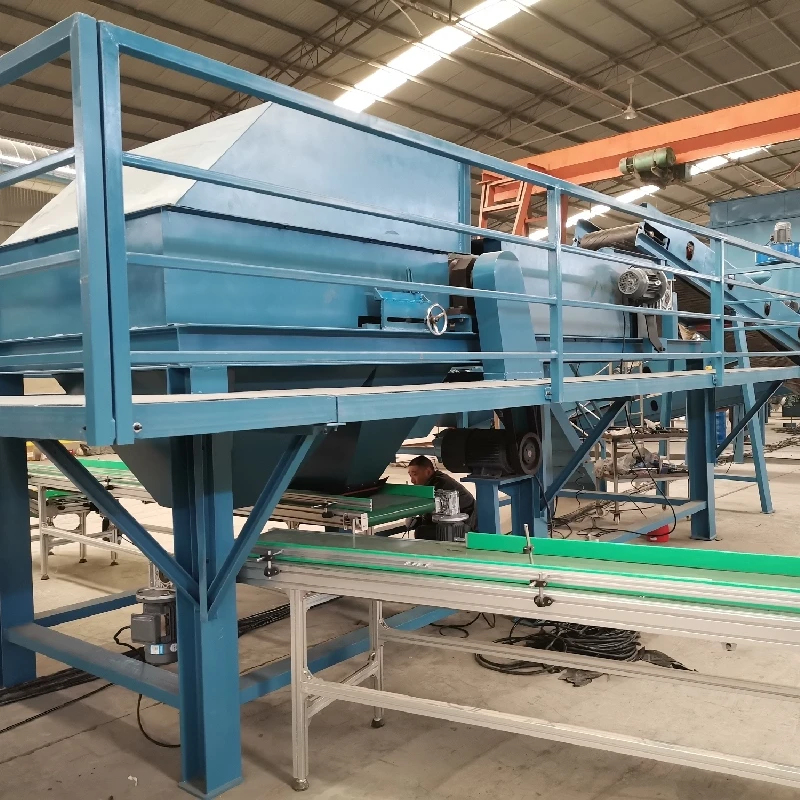

ታኅሣ . 14, 2024 16:05 Back to list
The Importance of Non-Ferrous Metal Separation in Recycling Processes
In today's world, where sustainability and environmental consciousness are becoming increasingly vital, the efficient recycling of materials stands at the forefront of this movement. Among the various materials that are recycled, non-ferrous metals play a crucial role due to their non-magnetic properties and resistance to corrosion. The separation of non-ferrous metals from waste streams is an essential process in recycling, significantly impacting economic and environmental aspects.
Non-ferrous metals, including aluminum, copper, lead, zinc, tin, and nickel, are primary players in various industries ranging from construction to electronics. Unlike ferrous metals, which contain iron and are magnetic, non-ferrous metals do not possess magnetic properties, making conventional methods of separation ineffective. Therefore, specialized techniques are required to ensure that these valuable materials are efficiently recovered from mixed waste and scrap.
The separation of non-ferrous metals begins with the collection of waste materials, including discarded electronics, automotive parts, and construction debris. Once collected, the materials undergo initial processing, which often involves shredding or crushing them into smaller pieces. This size reduction is crucial as it increases the surface area, facilitating effective separation.
The Importance of Non-Ferrous Metal Separation in Recycling Processes
Another effective separation technique is eddy current separation. This method involves passing the processed material through a magnetic field which induces electrical currents in the conductive non-ferrous metals, causing them to be repelled from non-metal materials. The result is a highly efficient and clean separation process that can recover up to ninety percent of non-ferrous metals from mixed waste.

Chemical methods can also play a role in separating non-ferrous metals, particularly when dealing with complex waste streams. Chemical treatments can help dissolve or react with certain materials to isolate the metals of interest. While these methods can be effective, they often require careful handling and environmental considerations to mitigate the impact of hazardous substances.
The economic benefits of non-ferrous metal separation cannot be overlooked. By efficiently recovering these metals, industries can significantly reduce their reliance on virgin raw materials, which are often more expensive and environmentally damaging to extract. The global demand for non-ferrous metals continues to rise, driven by advancements in technology and an increasing focus on sustainability. This presents an exciting opportunity for recycling industries to thrive.
Moreover, the environmental advantages of non-ferrous metal separation are substantial. Recycling metals reduces greenhouse gas emissions, conserves energy, and lowers pollution levels. For example, recycling aluminum saves up to 95% of the energy required to produce new aluminum from bauxite ore. This not only reduces the carbon footprint of metal production but also conserves natural resources, thereby promoting a circular economy.
As cities and industries around the world grapple with growing waste, the significance of non-ferrous metal separation will only continue to rise. Innovations in technology, such as advanced sorting algorithms and artificial intelligence, are expected to enhance the efficiency and accuracy of metal recovery processes. Furthermore, public awareness and engagement in recycling initiatives can promote higher compliance rates, ultimately improving the effectiveness of metal recovery endeavors.
In conclusion, the separation of non-ferrous metals is a vital component of recycling processes, offering both economic and environmental benefits. By implementing advanced separation techniques and fostering a culture of recycling, societies can effectively manage waste while preserving valuable resources. As we strive for a more sustainable future, non-ferrous metal separation will be instrumental in transitioning towards a circular economy, ensuring that precious materials are reused and repurposed rather than discarded. Embracing this challenge is essential for creating a greener planet and promoting responsible resource management.
Latest news
Troubleshooting Common Eddy Separator Problems
NewsJul.04,2025
The Role of Metal Recycling Plants in Circular Economy
NewsJul.04,2025
The Impact of Recycling Line Pickers on Waste Management Costs
NewsJul.04,2025
Safety Features Every Metal Shredder Should Have
NewsJul.04,2025
How Industrial Shredders Improve Waste Management Systems
NewsJul.04,2025
How Cable Granulators Contribute to Sustainable Recycling
NewsJul.04,2025